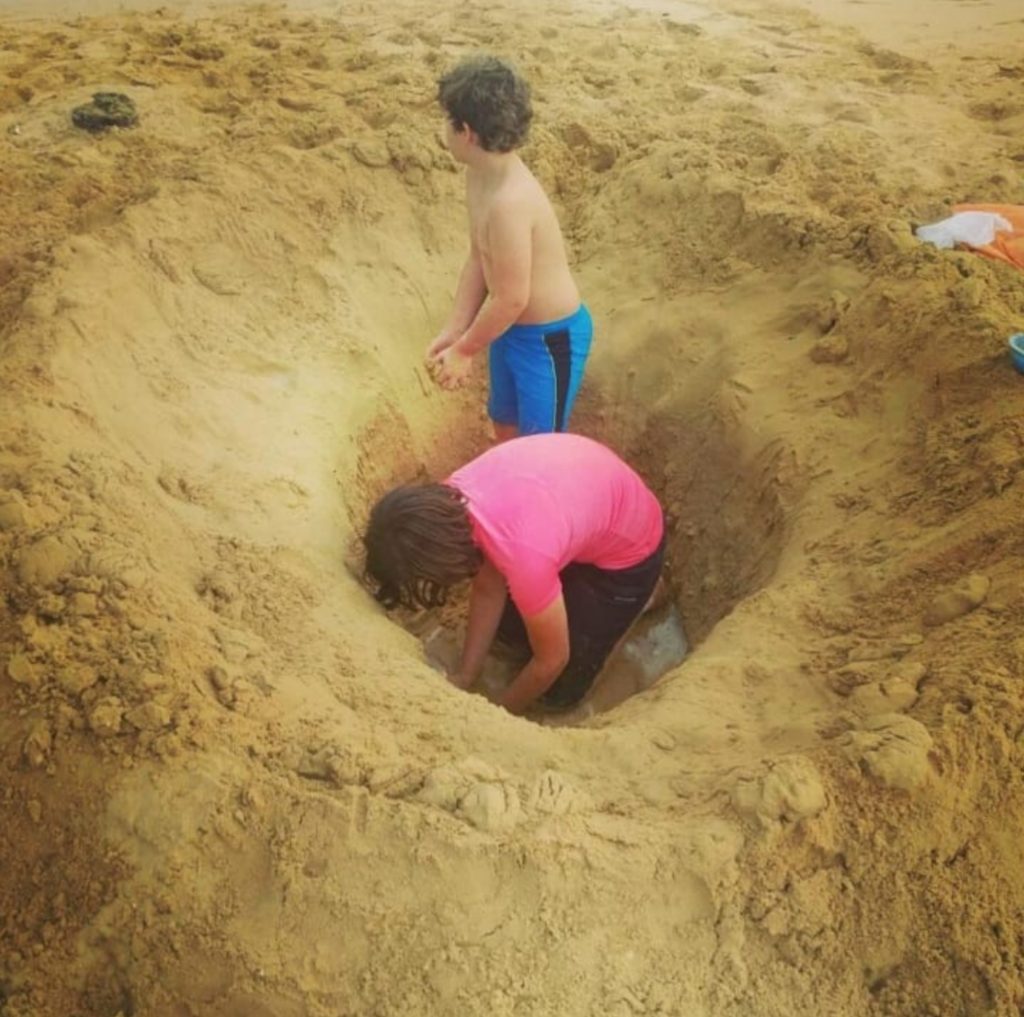Inspired by a conversation had with siblings while doing chores in the kitchen. While the resulting conclusions are my personal ones, the credit for the developing thoughts and the impetus of discussion is theirs.
One cannot dig half a hole. You can only have a whole hole. For any amount of digging creates a hole, and regardless of whether you make it wider, or deeper or better or more round, you will always have a whole hole. None of this fractions business.
In reverse, if you have a hole, you can un-hole it, or in layman’s terms fill it, in part. At least you can in reference. Your part-filled hole will of course still be truly a hole, and a whole one at that, but in your description of events, you may be completely correct in stating (either in pride or in defeat) that you have ‘filled half that hole.’ It is perhaps irrelevant that what is left is still very much still a hole. It is, interestingly, both a whole hole and half a hole. For that matter half a whole, also.
Similarly, one could imagine a situation in which a given hole, that one has dug, is in fact simultaneously a whole hole and half a hole. This would be in such a situation where one has specifically planned the dimensions of their desired hole and then part way through the process of creating such a hole, has stopped. Be it due to bad weather conditions, the desire for a nap, unexpected distractions from inconsiderate relatives who don’t understand the importance of the hole digging enterprise, his or her work has been paused. What is left, there in the ground, while most definitely a hole in and of its own right, like all holes on a spectrum of a hole for a seed, made by compressing soil with one’s pinkie finger, all the way to the large ditches dug for foundations in construction sites, also can be thought of as a sort of half hole, not a whole hole, if the desired hole is bigger than the currently existing one. If it is but a fraction of the hole in this avid hole-digger’s imagination. Yet this fact cannot be allowed to diminish the wholeness of the existing hole’s identity as a hole, so the concepts must co-exist.
You might tell me that surely the half hole doesn’t take on its hole identity until the digger of the hole has decided on the completeness of the hole, but if we go on the judgement of the reasonable man (a legal principle I am particularly fond of, and useful in its deference to common thought,) we cannot deny, that any uninformed, unconnected person passing by our digger’s efforts (possibly wet with rain or sweat, if the digger’s progress was indeed hindered by extreme weather) would prompted or unprompted, describe the indent to the earth as simply a hole. They would not see the need to clarify its percentage. In fact, very few people in their right minds can have wandered past any size of cavity in the earth and remarked ‘that is half a hole’ likewise, few, when prompted, would describe such a hazard such. And so a hole is a hole, regardless of whether its maker intends it to be changed in size or quality in the near or distant future.
Contrary to popular expectations, cakes are fundamentally different to holes. Particularly in the process of undoing one’s efforts. Likewise to man’s inability to dig half a hole (in all but a very conceptual sense) he also cannot make half a cake. Both a cake that has unfortunately lost one of its layers, and now lies lonely and low bearing to the table and a cake that has been peculiarly designed in the shape of a semi-circle are whole cakes. They are not half a cake. Certainly half a cake can be given, by means of chopping it in half with a very long knife, but ordinarily one cannot be made. In this halving process lies the essential difference of cakes and holes. This process of un-caking, by means of gifting or eating, resembles somewhat, the un-holing of a hole, but while the hole-maker is left with a whole hole, the cake-maker is left with only half a cake. In this respect they differ.
Indeed, they may differ further. It depends on whether the conceptual exception regarding ‘making a whole’ that applies to hole digging also apply to cake making? The poor fellow who lost a layer of his cake to clumsy carrying or a hungry cat, or a remarkable accident involving a unicycle may also say that he has made half a cake. Half the cake in his imagination, like the hole digger’s hypothetical, imagined hole. Does it separate them that the hole-digger is still in the process of creation, while the cake-maker is at the point of description, finished with the process? The kitchen is cleaned and tidied and no more layers are left to be made to complete his dream cake.
On this note, I suppose that we, when we make are making our cakes and giving reports to eager relatives, it is entirely valid to tell them that we have made half the cake. It is half the intention, in quite the same way that the half-dug, simultaneously whole and half a hole is half the hole-digger’s intended hole. Perhaps it matters not, whether there are plans to complete the project.
So it is an unsolved mystery, a problem unconcluded, as to the extent to which cakes and holes differ, but they do differ. They differ so fundamentally, that perhaps it is surprising.

